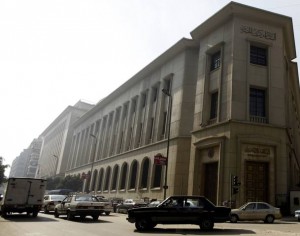
By: Nada Badawi
The Central Bank of Egypt (CBE)’s Monetary Policy Committee (MPC) announced a 50 point rate hike on Thursday, taking the overnight deposit rate to 9.75% and the overnight lending rate to 10.75%.
The rate of CBE’s main operations also increased by 50 points, while the discount rate jumped by 75 points to 10.25%.
The increase, prompted by the jump in the headline inflation in February, is the first increase since November 2011 despite the slowdown in economic growth.
The announcement came shortly after credit rating agency Moody’s downgraded Egypt’s sovereign credit rating last week to Caa1 from B3, citing unsettled political conditions and an increasing risk of default.
The downgrade, which moved the country to seven notches below investment grade, is the sixth since the January uprising.
The rate increases are likely to hit economic growth, predicted to hit 3% in June, which is far below the 7% that economists believe is necessary to create jobs for Egypt’s rapidly expanding population.
Rana Al-Mashat, sub-governor at the bank’s MPC, said in a press release that “even though the country’s GDP grew by 2.4% in the first quarter of FY 2012-2013, it is still partly suppressed by continuing weaknesses in the manufacturing sector”.
The GDP recovery was mainly seen in the construction and tourism sectors.
The release also published a statement detailing a 2.5% increase in the headline Consumer Price Index (CPI) in February, following an increase of 1.69% in January.
“This comes as the highest monthly increase since August 2010, pushing the annual rate to 8.21% from 4.66% recorded in December 2012,” the statement read.
The core CPI increased by 2.86% in February compared to 1.31% in January, which is recorded as the highest monthly raise since August 2010 and pushes the annual rate from 4.44% in December 2012 to 7.68% in February.
“Despite the downsides and the risks for the GDP’s outlook, the MPC judges that disanchored inflation expectations are more detrimental to the economy over the medium term. Hence, a rate hike is warranted,” said Al-Mashat.
Al-Mashat added that the recent monthly developments in both headline and core inflation were largely driven by broad-based increases in food and non-food prices.
The CBE blamed the jump in inflation on diesel and fuel shortages “on the back of the recent movements in the exchange rate”.
The bank acknowledged the impact political instability has had on the economic environment, specifically investment. “The turbulent politics will have ramifications on consumption as well as investment decisions, adversely affecting key sectors within the economy.”
Another issue highlighted in the document is the deterioration in value of the Egyptian pound, which has lost 9% of its value against the dollar since last year.
This pushed up the cost of imported goods and contributed to inflation in towns and cities which grew to 8.2% in February from 6.3% in January.
The bank has also restricted access to the scarce US dollar, after currency reserves hit a critical low of $13.5bn.
“The MPC will continue to closely monitor all economic developments and will not hesitate to adjust the key CBE rates to ensure price stability over the medium‐term,” the release concluded.




